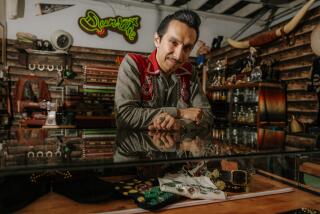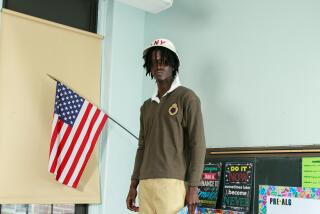American heritage brands make a comeback
When Charles Beckman sold his first pair of work boots for $1.75 in the sleepy town of Red Wing, Minn., in 1905, he probably never imagined that in 2008, those leather lace-ups would be selling for $235 at hipster havens Urban Outfitters and Opening Ceremony.
Call it blue-collar chic, sportsman style or retro prep. American heritage brands are being discovered by a new generation sporting Pendleton plaid shirts, Woolrich buffalo plaid vests, Filson field bags and Carhartt beanies.
American work wear has always been an inspiration for designers, most recently Ralph Lauren and Marc Jacobs. Young labels such as Adam Kimmel, Patrik Ervell, Rogues Gallery and Band of Outsiders incorporated traditional American checks and plaids, field coats and parkas into their menswear collections.
But the passion for Americana has moved beyond pure inspiration; now it’s about owning the real thing. And although the trend is more prevalent on the men’s side, it’s starting to catch on with women, who are wearing Bass Weejuns, oversized Pendleton shirts and leggings, and Red Wing boots with skinny jeans.
“It feels like a good time to be patriotic again,” says Ricky Swallow, a sculptor in Highland Park who likes to work in 1940s denim aprons and tracker boots from the century-old Quoddy Trail Moccasin Co. in Maine. “There’s an irony to it. You go to the Rose Bowl Flea Market, and you see a lot of fashion designers, people from Ralph Lauren, buying vintage clothes to make patterns. These traditional brands have informed fashion for a long time. Now fashion is helping them.”
With their tough, dry-finish tin cloth, worsted wool and traction-tread heels, these clothes are the antithesis of throwaway cheap chic, which makes them particularly attractive when dollars are short. They are nostalgic, playing into an insatiable appetite for all things retro. But they are also a blank canvas for a number of subcultures, including neo-grunge, preppy, hip-hop and surf ‘n’ skate, whose common value is authenticity.
Neo-grunge was the starting point for Urban Outfitters when it began buying into the Americana trend two years ago, trading $200 premium jeans by Diesel for skinny Levi’s and flannel shirts. In the last year the store has added Filson, Red Wing, Bass, Sperry and Patagonia to the mix. This summer, it will introduce Reyn Spooner shirts with a younger, slimmer fit, and possibly some pieces from Pendleton, L.L. Bean and J. Press.
Dan Leraris, head of menswear buying and design for the chain, admits that the names are not familiar to most of his core customers, who are between 18 and 24. “They trust us to educate them. These brands come from a real place. There are reasons for the way these things are. You can’t hide or refabricate it. It has soul.”
“It’s the idea that when you buy a Filson tin-cloth jacket, it was originally intended for the field, with lots of pockets for bullets or cigarettes,” Swallow says. “And now they work for cellphones and iPods.”
If you had any doubt that everything’s gone global, consider that it’s the Japanese and Europeans who helped reintroduce Americans to heritage brands in their own backyard. (Not that many of the goods are made in America anymore, but that’s another story.)
“American heritage is a huge part of the Japanese equation. Some of the best vintage is in Japan, and it’s all from America, “ says Humberto Leon, co-owner of the Opening Ceremony stores in New York and Los Angeles, who first noticed the trend a year ago when he was in Japan researching clothing lines to include in his current Japanese-themed store installation.
Leon ended up including Pendleton and Red Wing. The boot maker’s American-made “heritage” styles were available only in Japan until last year. Now Red Wing also sells the line at Urban Outfitters, Opening Ceremony, J. Crew, Bergdorf Goodman and Bloomingdale’s. Keanu Reeves and Ludacris have worn the boots, and Johnny Depp’s stylist recently pulled a few pairs.
“It’s becoming a smaller and smaller world, and success overseas is resonating on the home front,” says Jenny Tauer, Red Wing’s global marketing manager.
Daiki Suzuki, a New York-based designer who grew up in Japan, started his work wear-inspired line Engineered Garments in 1999. Two years ago he was recruited by Woolrich, the Pennsylvania outdoor clothier started in 1830, to design a younger brand-offshoot, Woolrich Woolen Mills, with stylistic as well as utilitarian details. A plaid field shirt jacket is nipped in at the waist and a fishing smock has hunters embroidered on it.
“I discovered American sportswear through movies like ‘The Grapes of Wrath,’ ” he wrote in an e-mail. “ Henry Fonda in those coveralls, leather jackets, work boots, wool blazers and newsboy caps made me think about clothes in a new way. These garments were not worn for fashion but for necessity, plus the stark contrast of the film, in black and white, just made him look so epic.”
Christophe Loiron had a similar experience growing up in North Africa and France in the 1970s, watching Brando and McQueen on the big screen. He opened the vintage store Mister Freedom in L.A. three years ago to pay homage to utilitarian clothing from the last 150 years by Filson, Pendleton and other brands.
Loiron can rattle off the features of a 1942 U.S. military shearling flight jacket (made for only two years), or the derivation of the peacoat (again, U.S. military). A few style blogs, such as acontinuouslean.com, archivalclothing.blogspot.com and referencelibrary.blogspot.com, are similarly obsessed.
But for Loiron at least, mainstream interest isn’t a bad thing. “What drives this country forward sometimes has erased its past,” he says, with a cigarette between his fingers in a very James Dean-ish stance. “I like that more people are recognizing quality and heritage of design and are willing to invest in one good Pendleton shirt instead of having 10 shirts they don’t really need.”
Of course, Loiron also has his own Mister Freedom line of vintage-inspired work wear, which he produces out of his store. And in a sign that things have really come full circle, the Japanese line Workers replicates American vintage pieces by such long-gone manufacturers as Crown in Cincinnati, down to the painstaking detail of crown-embossed buttons and “union made” labels.
Wonder what will happen when those show up in a vintage store.







